By-Laws Templates
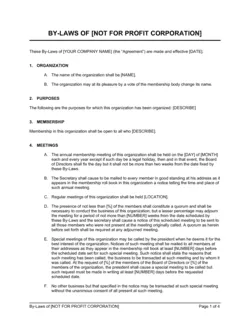
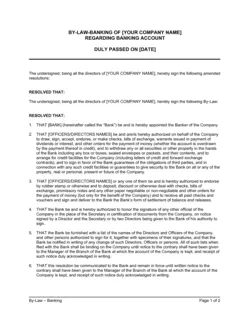
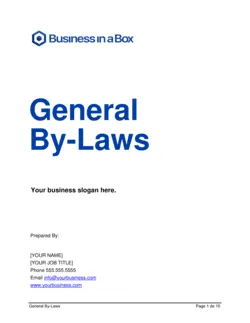
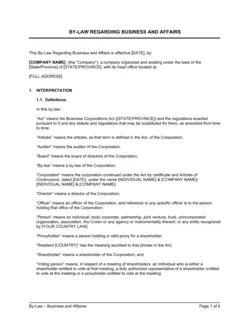
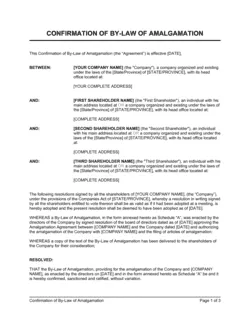
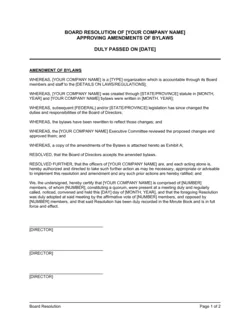
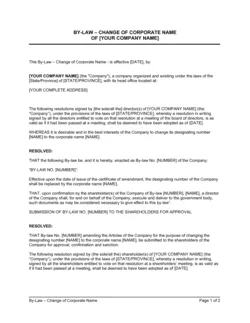
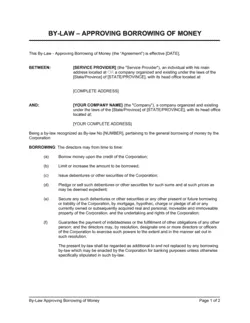

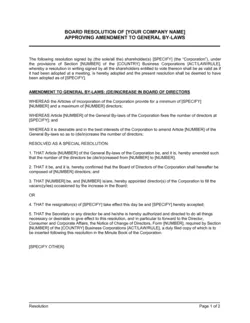
By-law Agreements: A Comprehensive Guide
A by-laws agreement is a legally binding document that specifies a company's policies and procedures, controlling and regulating the actions of its members. By-laws are comparable to operating contracts in that they establish the manner in which the company's board members will conduct operations. By-laws can be plain and transparent or extremely complicated, based on the number of investors the company takes into account and the size of the market.
Using a suitable by-laws agreement template will not only help you prepare such a legally binding agreement, but it will also secure your business from any financial and legal problems, should they arise later. This is done by giving the company a legal framework to make
What are By-laws?
Typically, it’s the original directors of a company who write the by-laws. After the by-laws are formed, each director must sign them.
With the assistance of a corporate by-laws framework, you can create the rules required to regulate your company. The agreements should be revised or changed whether a majority of directors of the company agree to do so.
Although by-laws are intended to be used by the company internally, different states and regions might have certain requirements for their inclusion. Additionally, some jurisdictions compel corporations to change certain default laws as well.
In certain instances, the by-laws are signed by an appointed director or officer. Companies can maintain by-laws besides the minutes of the meetings for their directors and shareholders as a good practice.
Although each company's by-laws have unique guidelines and restrictions, standard by-laws provide the company's title and identifying details, the protocols for board meetings, the processes for shareholder meetings, the amount of executives and board members in the organization, the categories of stocks the company offers, the protocols for maintaining documents and records, and the process for removing board of directors, along with many others.
The documentation required to establish a modern company varies according to the nature of enterprise you intend to create. While by-laws and operational contracts are internal documents, they should be as comprehensive as possible. This helps avoid potential disputes by simply outlining all laws and legislations.
When producing internal records, you might also need to work with a legal expert to ensure that all holders or representatives are in agreement. Effective operating procedures and by-laws will help any company run more smoothly on a regular basis.
Business-in-a-Box provides users with a comprehensive set of by-laws templates to choose from, with some of the most popular being the General By-Laws template, By-Laws for Not for Profit Corporations, Board Resolution Approving Amendments of By-laws Template, and Confirmation of By-Law of Amalgamation Template.
The Importance of Understanding By-laws
Before you begin the process of making a by-laws agreement for your company, it’s important for you to know the importance of understanding by-laws. These legal protocols are essential for the success of your company, as they act as legal precedents to guide you whenever an issue arises.
For example, if a new business is formed it will not have the required legal framework and system of internal controls to be effective in various situations. By-laws are important for companies as they provide a legal basis or framework that the company can use to regulate itself and deal with any arising issues.
If you want to regulate your company, you can use a general by-laws template. Although the majority of states mandate companies to adopt by-laws, there are typically no clear guidelines or legal framework for their content.
Even so, by-laws may address state-mandated organization requirements, including the composition of the board members and the manner in which by-laws can be changed.
Although not all states mandate corporate by-laws, it is advisable that you have one in place should corporate entities, potential investors, or regulatory bodies want to investigate your business's activities.
How By-Laws Differ From Articles of Incorporation
Corporate by-laws are an operational framework that establishe the guidelines and procedures for a company's day-to-day activities. Although each firm's by-laws are unique, they normally contain the company's name, objective, and status, the board of trustees, panels, executive officials, meetings, disputes, and revising by-laws. Generally, by-laws are not required to be submitted to any regulatory authority.
The Articles of Incorporation define the fundamental framework of a company. Usually, they would provide details regarding the individual that organized the company, the maximum amount of shares the company will sell, the details of the company's Board of Directors, and the firm's location.
Uses of By-laws
Determining the Organization’s Framework
Corporate by-laws are needed if you choose to determine the organization's framework. By-laws may describe the function of an organization, how it will work, and the roles and duties of the individuals who control and administer it.
Corporate by-laws are governed by state-specific legislation. Numerous states need boards to enact by-laws. The by-laws' scope is entirely up to the discretion of the particular company. If you have any concerns regarding the laws of your jurisdiction, you can get legal counsel.
Typically, the board members adopt corporate by-laws at their initial meeting. Across the company's lifetime, the by-laws can be used as a guideline to handle internal company affairs.
Additionally, the by-laws of a company can be changed. Generally, the procedure for amending by-laws is outlined inside the by-laws. Amending company by-laws usually entails making modifications and taking a vote at a regular management board meeting. Any amendments to a company's by-laws should be noted in the company's approved by-laws.
Establishing the Company’s Key Details
Another use of by-laws is to establish your company’s identifying details such as the company name and the location where the company will be based in. Choosing an eligible name is among the first steps in establishing a corporation. Due to the fact that companies must adhere to the rules of the state in which they are registered, the location of your company is often significant as well.
Since investors are effectively the owners of company, information about the annual conference should be provided to support voting. Along with a registry of shareholders, the by-laws should specify their voting privileges and the minimum number of representatives that are required to be present for a vote to take place.
Outlining Responsibilities for Board Members
The company's board is liable for drafting the company by-laws and establishing the selection procedure for its members, such as the scope of their authority, the duration of their tenure of office, information about the directors' meeting, the voting procedure, as well as how to handle dismissals, removals, and promotions of board members.
Moreover, the board has the authority to establish committees comprised of its own representatives for the purpose of delegating responsibilities. It is necessary to remember the operational aspects of these commissions.
The share category and ownership form should be specified, since they reflect the company's voting power and control. Additionally, it is prudent to specify how the firm can manage and distribute dividends to its owners.
Corporate by-laws may be modified to reflect the company's expansion, but the procedure varies by company. Generally, modifying by-laws should entail either a majority vote of the management board, investors, or both.
Components of a By-laws Template
When you use Business-in-a-Box’s by-laws template, you will get the most comprehensive by-laws template that will cover virtually every aspect of your business.
This will ensure that you can always refer back to your by-laws if you ever need legal information about how to handle a situation or conflict. Here are the components of a general by-laws template.
Seal and Offices
The first thing you will come across in your by-laws template agreement is a corporate seal for your company, which indicates that your company is officially a corporation.
This section will also cover and provide information about your registered office as well as any other offices the directors choose to carry out operations from. The location of the registered office is significant due to legal requirements.
Membership
This section of the by-laws template contains vital information about membership, including the definition of a person, conditions and application of membership.
This section also contains details on membership dues, registration, withdrawal and removal of system members, as well as regional associations
Meetings
In this section, you can find details and information regarding the various meeting of the company during the year, such as the company’s fiscal year and time of annual meeting.
Other details covered in this section include the auditors’ report, general and special general meetings, and regional meetings.
In addition, vote allocation to each voting member, majority of votes to determine question, and notice of meeting quorum are also covered.
Board of Directors
This section of the general by-laws agreement outlines the number of directors and who they can elect, with further classifications such as system members, service members, and trade members.
Furthermore, this section also contains information about the qualification requirements to become eligible for directorship of the company, as well as the details for reelections of existing directors, and vacation of office.
Besides that, this section also covers directors’ meetings, remuneration details, resignation process, and general powers of board members.
You can also find by-laws on the remuneration details of agents and employees, as well as information about delegation, borrowing, and committees.
Executive Committee
In this section, you’ll find details about the executive committee and their powers. You can also find by-laws about the meetings and quorum of executive committees.
Officers
This section will outline the roles and duties of various officers in the company, such as the chairman, president, secretary, and treasurer. It will also provide information about the removal and remuneration of these individuals, and other scenarios such as absence of chairman.
To round off the by-laws agreement template, the document also contains sections to detail aspects of the company such as indemnities to directors, officers and others, nominating committee and their duties, execution and certification of documents, rules and regulations, and amendment of by-laws.
Download Your By-laws Agreement
Here at Business-in-a-Box, we provide you with the highest quality legal documents. You can use our platform to get full access to over 2,000 business and legal templates and kick start your business.
To get a general by-laws agreement template for your company, sign up to Business-in-a-Box and kickstart your business today!


